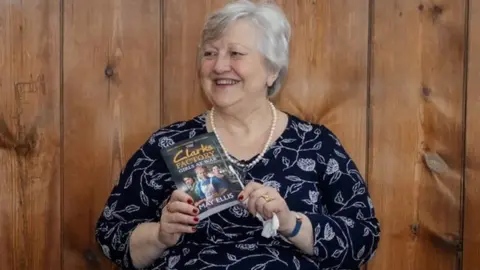Book set during WW1 shows Clarks factory was 'real heart' of Street
 Alison Knight
Alison KnightThe author of a book set at Clarks shoe factory wants to show the employer was "the real heart of the town".
Alison Knight said her novel about women working at the site in Street, Somerset, during World War One used "real events".
Prior to writing it, she extensively researched the factory and the lives of people working there.
Ms Knight said she felt "excited and terrified" before the book's publication.
"So many people I've met have worked at Clarks, their families have worked there for generations and so much of the village was built by the Clark family to benefit the community," Ms Knight told BBC Radio Somerset.
"I live right here in the centre of the Clarks' heartland, so if I've got it wrong, people are going to let me know," she added.
Former workers at the factory still regularly share their memories at gatherings of the Clarks Social Club.
 Getty Images
Getty Images"The breakup for Christmas was always a big event in the factory with most of the workers enjoying a few beverages in the local pubs at lunchtime," recalled one employee.
"One year it was made clear to everyone that too much drinking would not be tolerated and no one would be allowed home early.
"A large number got together and on their return started to dance the conga all around the factory floor gathering up more people as they progressed up and down the aisles.
"When they reached the main door they danced through it and disappeared off home (or back to the pub!). The bosses were red-faced with rage but couldn't sack them as there were so many involved," they added.
The first published story in Ms Knight's series, The Clarks Factory Girls at War, starts in 1914 and introduces three main characters - Jeannie, Kate and Louisa, who work together in the factory.
Ms Knight said she did a lot of research in the Alfred Gillett Reading Room in Street to provide integrity to her writing.
'I was amazed'
"The archivists were brilliant; finding documents and photographs for me to study that gave me a real flavour of what it was like working at Clarks during the First World War.
"There were minute meetings and even letters to and from members of the Clark family.
"I took some real events happening at that time and fictionalised them, although I did use a couple of names of real directors and a forewoman from the time," she said.
The Clark family were Quakers, part of a pacifist movement during the war.
Ms Knight said she had discovered the Clarks were generous to both the people left behind from war and the men who returned wounded.
"I was amazed with what I found. Clarks gave extra lessons to younger boys who came to work in the factory, so they could continue some of their education.
"They were very aware that life was changing dramatically during the war and were trying to do their best for the community." she said.
Ms Knight writes under the name May Ellis, which was also the name of her grandmother.
She said: "The original May Ellis was born in 1900 so would have been a contemporary of the girls I write about in these books."

Follow BBC Somerset on Facebook and, X. Send your story ideas to us on email or via WhatsApp on 0800 313 4630.
